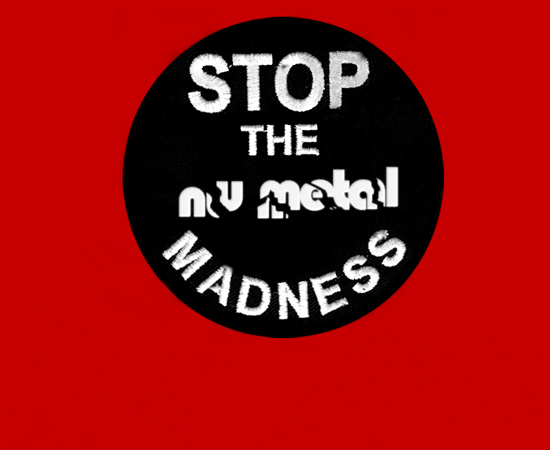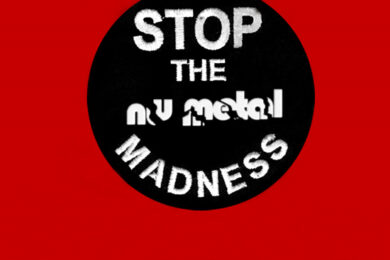"Nu-metal makes my stomach turn. Don’t blame that poo poo on us, blame it on their mothers! Do you think I listen to any of that stuff at all? No, it’s for 13-year-old morons! Believe me, we’ll all be laughing about nu-metal in a couple of years. Heck, I’m actually laughing at it now!"
Mike Patton, Metal Hammer 2002
Mike Patton’s quote may have become a little out of date – after all surely few self-respecting 13 year olds would ever listen to nu metal these days – but the sentiment is as relevant as ever; of all rock and metal’s various sub genres, nu metal is surely the one that deserves the greatest mockery. An all time low point musically, lyrically and culturally, it was the most unseemly boil ever to grace metal’s weathered face. In fact the only thing it did seem to have going for it was a fairly limited shelf life. Quite apart from the total lack of musical ambition present, it’s very name – and let’s not forget it was frequently tagged ‘Nineties Metal’ at the time – seemed to say it all. Nothing can stay ‘nu’ for long. Indeed, the genre’s decline at the start of this decade looked reassuringly like a one way trip. But with this year’s Download festival line up worryingly including a newly-reformed Limp Bizkit, it seems this scourge has returned from the grave to haunt us once again. Dear God, why?
Looking back, nu metal was a fairly natural progression of the increasingly ‘alternative’ nature of metal’s mainstream at the time, and drew inspiration from some pretty good bands into the bargain. While ‘alternative metal’ acts Faith No More and Mr Bungle were tapped more than any other groups, both vocally and instrumentally, further ‘funk rock / rap metal’ inspiration was undoubtedly drawn from the likes of Primus, the Chilli Peppers and, perhaps most obviously, the impressive Rage Against The Machine, though, needless to say, the political fury of that band was quickly replaced by a uniform of fake teenage angst and narcissistic introspection. Awesome!
Aside from these direct influences it should be remembered that in the early nineties, before nu metal was shat into the world, grunge and MTV-friendly ‘alternative rock’ were not only dominating the rock world, but forcing metal bands to either adopt more urban trappings or risk seeming as hopelessly out of touch as the fast redundant glam and hair metal bands. Hence the rise of bands like the forward-thinking Fear Factory and the formidable Machine Head, whose frontman Robb Flynn had previously contributed to more traditional thrash acts Vio-lence and Forbidden. Similarly, there was a notable change of tack for Sepultura around the Chaos AD release, which seemed to consciously tone down the underground thrash sensibilities of the previous albums.
With this prevailing climate, the appearance of Korn’s self-titled debut album seems like the next step in this evolution and, to be fair, musically it wasn’t without merit or vision. In fact to their credit much of Korn’s early work was pretty enjoyable and surely only the most unkind critic would write off a track like ‘Blind’, the song and music video which arguably launched the entire scene. Still packing a punch now – though one diluted somewhat by an over exposure to its imitators – it clearly bears a trace grunge/alt metal influence both musically and aesthetically, though the silly clothes – seemingly a bad approximation of hip hop fashion – and bad hair which became the visual trademark of the scene are already evident on certain members.

Sadly despite this bright start, Nu metal almost instantly stagnated creatively, with bands quickly adopting the ideas of Korn and the bands that had inspired them, stripping them to their base components and churning out identikit songs. One such example was Coal Chamber who, like Korn (and a huge majority of the nu metal scene) hailed from California. Sadly for them they have now undoubtedly become something of an icon for nu metal’s limitations and while vocalist Dez Fafara has managed to redeem himself with the successful (and far more credible) Devildriver, one has to feel for the other members of the band whose legacy is a collection of one-idea songs and a portfolio of truly laughable photos. No wonder bassist Rayna Foss turned to God and left the band, strangely pre-empting Brian ‘Head’ Welch who left Korn some years later for the same reason.
But while their embarrassingly childish ‘mallcore’ aesthetic makes it easy (and probably quite fun) to single out Coal Chamber as chief purveyors of trendy, unimaginative tripe, they were sadly far from the worst offenders. Down tuned guitars, one-chord riffs, bratty, self-important lyrics and vocals that alternate between pointless shouty parts and pointless clean parts do not a good song make. Yet this stale formula was followed ad nauseum to great commercial success. And perhaps that’s the main problem. Nu metal was such a huge success from the start that it was inevitable that any sense of artistic integrity would quickly be eaten away.
Great Metal has always traditionally risen from the underground. Thrash, for example, may have spawned one of metal’s biggest names in Metallica but both the genre and the band attained popularity thanks to the blood, sweat and tears of young musicians, who were motivated by their love of the music with little hope of financial reward, at least initially.
Compare that to the nu metal scene where bands were signed to money-hungry major labels on the strength of perhaps one demo and you have a scene where expectations of success were so high that it’s very easy to see why so many played the game and did their best to shift units. Artistic integrity won’t pay the mortgage, as Gene Simmons would possibly say. Sure, a few bands achieved success while side-stepping the genre and forging their own identities – Slipknot and System Of A Down being two of the more obvious examples – but for the most part this was lowest common denominator pop metal – shallow, radio friendly and disposable. And thus it attracted, for the most part, the same lazy, vacant teenage fans that, had they been born slightly earlier, would have listened to glam or stadium rock and would, had they been born slightly later, probably be listening to emo. Or something similarly awful.
This was metal for people who didn’t really like metal, and didn’t understand, or care about, metal culture. Just as bands at the most commercial end of pop punk such as Blink 182 and Sum 41 managed to rip the heart out of a sub culture, then sold it in easily accessible chunks to the sort of people that that very sub culture had carefully distanced itself from, so too did nu metal. Sometimes described as ‘jock rock’ it was unhappily a demographic made up largely of angsty but unproductive teens, bandwagon jumpers and drone-like youths desperately trying to rebel and appear ‘street’ despite the comfortable white middle class confines of their parent’s homes. Limp Bizkit, perhaps more than any other band, seemed to encapsulate this.
The term ‘rap metal’ or ‘rap rock’ is often used in a derogatory manner by metalheads when referring to Limp Bizkit and nu metal generally. Actually this is pretty unfair. If nu metal shows metal in a bad light, it almost certainly does the same for rap and hip hop. Sadly most nu metal fans took as little notice of the music and culture of ‘real’ hip hop as they did that of ‘real’ metal, the result being the creation of a sub/non culture that had almost no connections to the genres that had spawned it, beyond some downtuned guitars and baggy trousers. And it was this detachment that makes nu metal such a royal pain in the butt.
There’s no doubt that the rest of the metal scene was suffering no end during nu metal’s reign, being the product of this downturn but also largely the cause. Magazines as varied as mainstream rock weekly Kerrang! and extreme metal monthly Terrorizer turned their attention to these bands in what turned out to be a hopelessly one way relationship. Metal elitists may moan about high selling acts – such as Slipknot and Trivium – now, but the connection between these high sellers and the more general metal community means that a definite trickle-down effect occurs.
Perhaps a million people buy a Slipknot album, and inevitably maybe a tenth of them may delve a little deeper and pick up something from an act like, say, Arch Enemy. In turn a tenth of those may make the effort and pick up a Napalm Death album and so on right down to an unsigned grind band getting a handful of extra fans. No one starts their metal life listening to Wolves In The Throne Room, Dismember, Watain or even Municipal Waste – they get into these smaller, less accessible bands over time. For some of us it all started with Metallica or Iron Maiden, for some Lamb of God or Killswitch Engage – but where does a kid listening to Cold or Papa Roach go?
Right now metal is in an extremely good state of health: From the smallest underground black metal show right up to the largest stadium super bill, concerts are pulling stronger numbers than they did in the nineties. Record sales are positive despite the mp3 revolution because metal fans generally support the bands they love. Metal magazine sales are also surprisingly strong despite the general cull on printed periodicals (Metal Hammer recently overtook NME in terms of circulation as an example). Even metal’s current mainstream trend, metalcore and deathcore (and their various hybrids) are infinitely more integrated to the metal scene musically and socially than nu metal ever was. Sure not all those young MySpace kids with the funny fringes will be here for long, but with groups drawing inspiration from death metal acts such as At The Gates, it’s at least resulted in a greater level of support for some pretty brutal bands (see the Prosthetic and Metal Blade rosters for evidence of this cross pollination).
To paraphrase a certain Roadrunner anti drugs campaign, nu metal is no fun and endangers the happiness of millions of metal fans. I appeal in particular to the youth of today, as well as those in their 20s or 30s who might be tempted to dabble again for nostalgic reasons. Stop the madness. There are better things in life.



